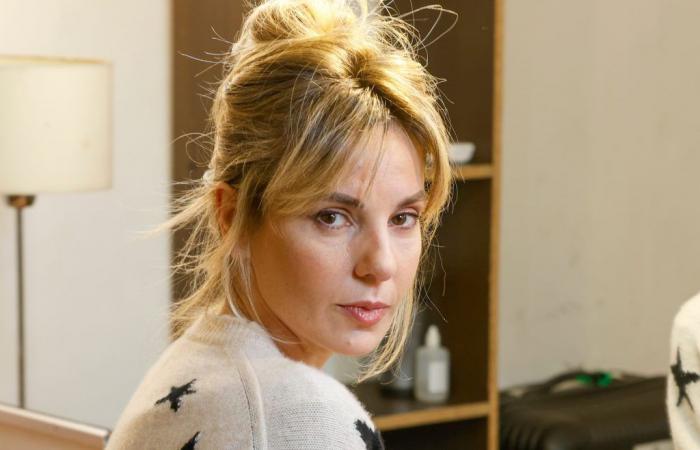
June 26, 202411:45
Hear
She was Paquita de Xuxa when she was just 14 years old, but she only discovered that she was interested in acting when Alejandro Agresti called her to film One night with Sabrina Love. She has been working between Argentina and Spain for a long time and now she is taking the stage of the Dumont 4040 Theater to star in It doesn’t have a tearthe first work directed by Rita Cortese. In dialogue with THE NATION, Julieta Cardinali tells why he did little theater in his career, remembers his beginnings at the hands of Xuxa, talks about the great relationship he has with his daughter Charo, 17 years old and fruit of her love story with Andrés Calamaro, and says that, for the first time in a long time, is not in a couple.
-You did very little theater, why?
-It’s been at least eight years since I’ve been on stage. I’m not an actress who has done much theater, it’s true. More than anything movies and series, in recent years. It happened like this, I started working a lot outside, I had to travel and it was difficult; If they offered me something capable I couldn’t or it wasn’t available. And throughout my daughter’s childhood I preferred to work during the day…(laughs). It seemed not compatible for me. Charo is now 17 years old, he finishes high school and now I allow myself other things, to have my time in a different way. She did a series in Spain and she came with me, she is already traveling alone. It’s another dynamic, easier. Everyone says that adolescence is difficult and I am upset; I enjoy it. I liked all the stages of my daughter, But I’m really enjoying this one. She is calm and goes out like any girl.
-So, your daughter is older and you allow yourself to do theater… is that right?
-Something like that. This return arose because for some time I have wanted to do something in theater that I want to tell. I am a big consumer of independent theater, too. Rita and I have been very friends for many years. and we have wanted to work together for a long time; She with the desire to direct and I, to act. There was the idea, but when we got together we talked about anything but that… (laughs). Until last year she gave me this work that was originally called Heroes Square, by Thomas Benhard, and which she did many years ago at the Teatro San Martín with Pompeyo Audivert and directed by Villanueva Cosse. It has wonderful texts, it is very interesting and we called Carolina Santos who adapted it for two characters and was the one who ordered us. Because every time we met Rita it was a party, but we didn’t get anywhere. We needed someone like her who structured everything, we looked for an actress younger than me and we came up with Vera Spinetta, whom we didn’t know. We were not wrong in choosing her because she is a beautiful actress and person. We are very excited, premiering a beautiful work based on an idea we had one day at Rita’s house, between drinks and affection.
-How did that friendship with Rita come about?
-We love and admire each other a lot. We met in a series called Malandras of the Borensztein brothers. We became good friends, but then we didn’t see each other for a while and we met again in the series Maradona blessed dream. During the pandemic we kept each other a lot of company and it is a privilege to be in the first play he directs. It’s a new challenge for me. I am very committed and focused, I love the work and I want it to be seen and liked.
-And what is this work about that seduced you?
-It was written in the late 80s in Austria and talks about the advance of hate speech. When we read it we realized that it is absolutely current. 40 years have passed and it is incredible. It is a poetic and hopeful text that mobilizes you and challenges you. A tragedy has just happened, two grieving housekeepers locking up the house they work at. For two months we will be on Thursdays, at 8 p.m., at Dumont 4040.
-How do you get along with the current situation in our country? Is your look also hopeful?
-It’s hard for me to be hopeful because I don’t see it, for now. I refuse to think that everything is going to be bad forever because I have a daughter and I want her to live in a country that works, in democracy and that does not have to be lost from any point of view. We can think differently, but we have to respect each other. My speech at my house has to do with that too. Everything is difficult and I find it hard to see a better future.
-You work a lot in Spain, was it ever a possibility to live there?
-I work a lot in Spain, but I really like living in Buenos Aires. I like my friends, my family, living here, and I am lucky to be able to come and go. The truth is that in recent years I have worked further afield than here. I made a long series called Romance which is on Prime and my representative is Spanish. However, today I am interested in being with the people I love and sharing life with them, who are here. Then I can go, work, and come back. I am at the antipodes of what is happening politically today in our country and I continue to choose to stay. My daughter finishes school this year and the big question is what she is going to do.
-Is this the big topic of conversation at home these months?
-It’s an endless talk… (laughs). I tell him to find something he likes because that’s what it’s all about. I always give the example of what happened in my house when I said I was going to study theater, my mother almost died (laughs). She was very young. Charo is pursuing the artistic side, but he doesn’t really know what he likes and he wants to go to college too. He is investigating. There is a lot of pressure at 17 years old because they have to decide what they are going to do for the rest of their life. I see Charo and her friends with a tremendous level of stress and I tell them to calm down, that if they start a race and they don’t like it, they do another one and everything is fine.
-Are you a permissive mother?
-No, my daughter had a classic upbringing. She accompanied me when she traveled to work in another country and somehow we managed. I am a present mother and I always made my decisions based on her. I’m like any mother with teenage children. But I’m not suffering from her adolescence and I also have a life that I like. I have melancholy from when she was little, but nothing more.
-Are you in a relationship?
-I’m alone. I separated two years ago from my last boyfriend and it is the first time I am alone. I’m upset. I like to fall in love and love, but I’m very well, enjoying it. It’s another stage of my life.
-And now what’s next in your life, besides theater?
-I am in the last two weeks of filming a series for Flow what is called a lion in the forestby Mariano Hueter. We spent three weeks working in Pinamar and I am very happy.
-You had few ups and downs in your career, do you see it that way too?
-Yes, I have had few potholes. I have been working since I was very young and I am very hard-working.
-You said that it didn’t go down very well in your house that you wanted to be an actress, how was it?
-I didn’t know I wanted to be an actress until I was well into my teens. I discovered it little by little. When we finished school there was already worked for two years with Xuxa, at 14 years old. It was good, but I realized that it wasn’t that way, and when I was in the 5th year I took a theater course and I understood that that was what I was looking for. At home they told me yes, but that I had to go to college and they made me enroll in business administration. Of course, I didn’t even start because I was already working. I was independent from a very young age because I worked and earned my money and I went to live alone. Later my mother understood and accompanied me, but At first it didn’t like it in my house. They told me that doing theater was not studying.
-And what was your first real job?
–roller coaster and then Summer of ’98. I wasn’t wrong, but it takes a lot of effort because we don’t have a huge industry. I did a lot of television when I started while studying with Julio Chavez and it was a pleasure to work with him later on Fakers. The strips were like a training ground, an opportunity to shoot many scenes a day and apply what I studied. When I filmed with Alejandro Agresti, I realized that cinema is the space that I enjoy the most. And I filmed a lot.
-How did you become Xuxa’s paquita?
-I studied classical dance and wanted to be a dancer. One day I saw on TV that in the program Xuxa were looking for dancers to be paquitas. They asked for a resume and I sent a photo and a letter in which I told my age, what I did, what I wanted. My mom told me yes, although without paying too much attention to me… (laughs). Shortly after they called me, I did casting for six months and I stayed. I never thought that would happen. It was a game that became a job.
-What memories do you have of that moment?
-Recently one of the Brazilian paquitas called me, Catu, because they made a documentary for Red O’ Globo. She remembered very little and as we talked, I remembered. She told me that the same thing happened to many little girls and I think it’s because we were very young and we were in an adult world. They were two incredible years And it was also hard work because we worked long hours. I had been left with the idyllic feeling of that moment and I remembered that it was also very tiring, although it was great and I would do it again. However, if my daughter had asked me to work at 14, I would not have let her.
-Were you paquita at the same time as Natalia Oreiro?
-Yes, because Nati entered through an international paquita contest and came through Uruguay, but he was only there for a short time. I was there more and we recorded every time Xuxa came to the country.
-And you were Evita twice, in theater and on television, how did you build such an iconic character?
-In theater I did Eva and Victoria with Leonor Benedetto and directed by China Zorrilla. And many years later I did a casting here with Agustí Villaronga for a two-episode series for Spanish Television, Letter to Eva. We spent a whole month rehearsing in Barcelona, one month for one chapter and another for another. We worked with Carmen Maura, Ana Torrent, I won many awards. It is a job that gave me a lot of pleasure and joy, and that opened doors for me in Spain. The series tells the relationship between Eva Perón and Carmen Polo, Franco’s wife. I did a lot of research, reading, listening and trying to build Evita’s personal world. It was a privilege.
-You also played Claudia Villafañe, another challenge because she is someone who lives…
-Absolutely. I did, but I didn’t talk about it before I played the character. The important thing was to do it with the utmost respect. I defended it tooth and nail because that’s how we wanted to tell it. It was a challenge. I don’t know if she was happy, but I did it with total love. It was very funny because it’s a story that marked an era and we went on set dressed up as characters we knew and we were dying of laughter. It was very funny, and we also filmed in Naples and Barcelona.





